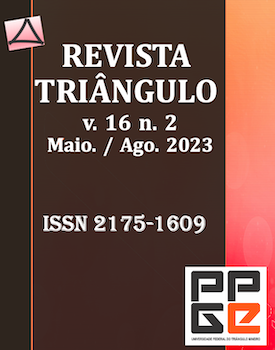Ensino de história antirracista e a Lei 10.639/03
cultura Hip Hop e suas educabilidades
DOI:
https://doi.org/10.18554/rt.v16i2.7048Palavras-chave:
Ensino de História, Cultura Hip Hop, Educação Antirracista, Formação de ProfessoresResumo
A Lei Nacional 10.639, sancionada em 2003, que obriga o Ensino da história e Cultura Afro-brasileira nas escolas é uma das conquistas, preconizada pelos movimentos sociais, particularmente, pelo movimento negro brasileiro. Neste trabalho, nosso objetivo se volta para compreender as contribuições que a Cultura Hip Hop pode aportar ao ensino de história na educação básica, tomando por foco as práticas curriculares voltadas ao último ano do ensino fundamental. Lançando mão da ideia de educabilidades, examina-se, desde a gênese do Hip Hop até as formas atuais de expressões próprias desta cultura. Nessa direção despontam, em especial, a Técnica da Sampleagem e da Mixagem como potenciais recursos para exercitar na docência do ensino de história. Dentre os destaques se observa a potencialidade que se apresenta nestas práticas culturais que ainda precisam ser melhores tratadas no ambiente do currículo escolar e no ambiente da escola de forma mais ampliada. Acreditamos que tanto os profissionais da educação (professores) quanto a comunidade e os estudantes são convocados a exercitar o protagonismo, ao conhecer, praticar e reconhecer a cultura hip hop, uma vez que o uso das técnicas implica em processos coletivos, abertos e interativos de aprendizagem.
Referências
CARVALHO, Nilton Faria de. DJs, remixes e samples: inovação, memória e identidades na linguagem híbrida da música nas mídias - São Caetano do Sul: USCS Universidade Municipal de São Caetano do Sul, 2016. 147 p.
FERREIRA, Rafael Mautone. Cultura Hip Hop para o Ensino de História Antirracista: educabilidades nos Anos Finais do Ensino Fundamental. Dissertação de Mestrado (Mestrado em Educação. Universidade La Salle – Canoas, 2023.
FERNANDES, Joseli Aparecida; PEREIRA, Cilene Margarete. Do Griot ao Rapper: narrati- vas da comunidade. Revista da Universidade Vale do Rio Verde, Três Corações, v. 15, n. 2, p. 620-632, ago./dez. 2017. Disponível em: <http://periodicos.unincor.br/index.php/revistaunin-
cor/article/view/4261/pdf_705>. Acesso em: 07 jun. 2021.
GOMES, Nilma Nino. O Movimento Negro educador: saberes construídos nas lutas por eman- cipação. Petrópolis, RJ: Vozes, 2017.
GOMES, Luana Barth; FLORES, Cristine Gabriele de Campos; SILVA, Gilberto Ferreira da; CASAGRANDE, Cledes Antônio. Por uma escola intercultura: a sala de aula como um lugar de muitas histórias. Inter-Ação, Goiânia, v.46, n.1, p.95-112, jan/mar.2021.
GUSTSACK, Felipe. Hip-Hop: Educabilidades e traços culturais do movimento. Porto Ale- gre/RS. 2002.
MESQUITA, Pedro Henrique Parente de. Nas batidas dos beats e na cadência do flow: HIP—HOP. Ensino de História e identificação Racial. Natal/RN, 2018.
NOVAES et all. “A carne mais barata do mercado (acadêmico) é a carne negra”: O estado da arte sobre o diálogo entre as relações raciais e a educação em periódicos brasileiros de educação. Pró-Discente: Caderno de Produção Acadêmico-Científica. Vitória-ES, v. 26, n. 1, p. 30-49, jan./jun. 2020. Disponível em: https://periodicos.ufes.br/prodiscente/article/view/30850 Acesso em: 30 ago 2023.
ORTIZ OCAÑA, Alexander; ARIAS LÓPEZ, María Isabel. Hacer decolonial: desobedecer a la metodología de investigación. HALLAZGOS, vol. 16, n° 31, ene-jun. 2019. Bogotá D. C., Colombia. p. 149-168. Disponível em: http://www.scielo.org.co/pdf/hall/v16n31/1794-3841- hall-16-31- 147-166.pdf. Acesso em: 19 fev. 2021.
PEREIRA, Grazielly Alves. Resistências Afro-Brasileiras no ensino de História: A sala de aula e as letras de RAP. Guarulhos/SP, 2019. 145 fls.
PIMENTEL, Spensy. Livro Vermelho do Hip Hop. São Paulo/SP, 1997.
PINHEIRO, Leandro R.;AMARAL, Márcio de Freitas do. O enunciar identidades na con- figuração de um Movimento Social: reflexões sobre as tomadas de posição do Hip Hop .36ª Reunião Nacional da ANPEd – 29 de setembro a 02 de outubro de 2013, Goiânia-GO.
RODRIGUES, Leandra A. M. S; BARBOSA, Mayara L. O.; RIBEIRO, Cristiane Maria. Mapeando a pesquisa em educação das relações étnico-raciais. Cadernos de Pesquisa. São Paulo, v. 52, 2022. pp. 1-25. Disponível em: https://www.scielo.br/j/cp/a/PydYSVHnz3g88S6MrkfLR8F/?format=pdf&lang=pt Acesso em: 21 ago 2023.
SAPIÊNCIA, Rincon. A Coisa Tá Preta. São Paulo: RINCON SAPIÊNCIA, 2016. Disponível em: https://www.youtube.com/watch?v=FsTTvHoLxEAM Acesso em 27 de Março de 2023.
SILVA, Gilberto Ferreira da; MUNSBERG, João Alberto Steffen; FUCHS, Henri Luiz. O cur rículo decolonial: da reflexão à prática intercultural. Religare, ISSN: 19826605, v.16, n.2, de- zembro de 2019, p.593-614.
SPIVAK, Gayatri Chacravorty. Pode o subalterno falar? Belo Horizonte: Editora da UFMG, 2018.
ZANETTI, Fernando Luiz. A Estética da Existência e a Diferença no Encontro da Arte com a Educação. Educação & Realidade, Porto Alegre, v. 42, n. 4, p. 1439-1458, out./dez.2016.
Downloads
Publicado
Edição
Seção
Licença
Copyright (c) 2023 Revista Triângulo

Este trabalho está licenciado sob uma licença Creative Commons Attribution-NoDerivatives 4.0 International License.
Autores que publicam nesta revista concordam com os seguintes termos: Autores mantém os direitos autorais e concedem à revista o direito de primeira publicação, com o trabalho simultaneamente licenciado sob a Licença Creative Commons Attribution que permite o compartilhamento do trabalho com reconhecimento da autoria e publicação inicial nesta revista.




